ACCA证书注册及领取知识!
发布时间:2019-07-20
2019年6月ACCA考试已经结束,很多小伙伴已经开始准备9月份的考试了,但是尽管已经考过ACCA一个科目或者几个科目很多小伙伴对于ACCA的证书注册地信息仍不了解,ACCA在哪注册?ACCA注册后究竟有什么用?ACCA可以领取哪些证书?这些知识点相信很多小伙伴都不是太了解吧,为此小编特地整理了如下内容。
一、ACCA注册简介
ACCA是"英国特许公认会计师公会(The Association of Chartered Certified Accountants)的简称,是世界上领先的专业会计师团体,也是国际学员最多、学员规模发展最快的专业会计师组织。ACCA会员资格得到欧盟立法以及许多国家公司法的承认。
英国特许公认会计师公会(The Association of Chartered
Certified Accountants)简称ACCA,成立于1904年,是世界上领先的专业会计师团体,也是国际学员最多、学员规模发展最快的专业会计师组织。ACCA总部设在伦敦,在美国洛杉矶、加拿大多伦多、澳大利亚悉尼建有分会,在世界上70多个城市均设有办事处。
ACCA为全世界有志投身于财务、会计以及管理领域的专才提供首选的资格认证,一贯坚持最高的标准,提高财会人员的专业素质,职业操守以及监管能力,并秉承为公众利益服务的原则。
在英国,英国立法许可ACCA会员从事审计、投资顾问和破产执行的工作。ACCA会员资格得到欧盟立法以及许多国家公司法的承认。ACCA在欧洲会计专家协会(FEE)、亚太会计师联合会(CAPA)和加勒比特许会计师协会(ICAC)等会计组织中起着非常重要的作用。在国际上,ACCA是国际会计准则理事会(IASB)的创始成员,也是国际会计师联合会(IFAC)的成员。
二、ACCA证书
其实,每个阶段完成后,ACCA官方协会都会颁发相应的证书鼓励ACCA考试小伙伴继续考下去,同时这些证书都可以帮助你找实习找工作、升职加薪、申请国外留学等等
商业会计证书
当学员完成Knowledge部分——Accounting
in Business, Management Accounting, Financial Accounting这三门考试,并且通过基础阶段道德测试,即可获得商业会计证书。如已免试,无法获得此证书。
高级商业会计证书
当学员完成Skill部分——LW, PM,
TX, FR, AA, FM六门考试,并且完成道德测试模块,即可获得高级商业会计证书。如全部免试将无法获得此证书。
牛津布鲁克斯大学学士学位
考完ACCA前9门可申请英国牛津布鲁克斯大学应用会计学学士学位,想要申请学位需要提前提交英语成绩证明,并且写一篇英文论文,通过后即可获得此学位。
牛津布鲁克斯大学硕士学位
13门全部通过以后将有机会申请牛津布鲁克斯大学MBA硕士学位,需要去英国学习答辩,论文答辩通过即可获得硕士学位。
ACCA会员证书
通过13门考试,即可获得ACCA准会员证书。累计三年工作经验,即可申请转为正式ACCA member。
综上所述就是关于ACCA注册信息以及证书领取的全部内容希望对于各位正在备考的小伙伴们有帮助,小编将持续更新ACCA相关资讯。
下面小编为大家准备了 ACCA考试 的相关考题,供大家学习参考。
(ii) Any increase or decrease in the group’s budgeted corporation tax liability for the year ending 30 June
2008 due to the restructuring on the assumption that trading losses will be used as efficiently as
possible. (8 marks)
(ii) The budgeted corporation tax liability for the year ending 30 June 2008
Following the proposed restructuring, Rapier Ltd will be carrying on four separate trades. The current year loss arising
in the Dirk trade can be offset against its total profits. Its three subsidiaries will be dormant and will not be associates
for the purpose of determining the rate of corporation tax.
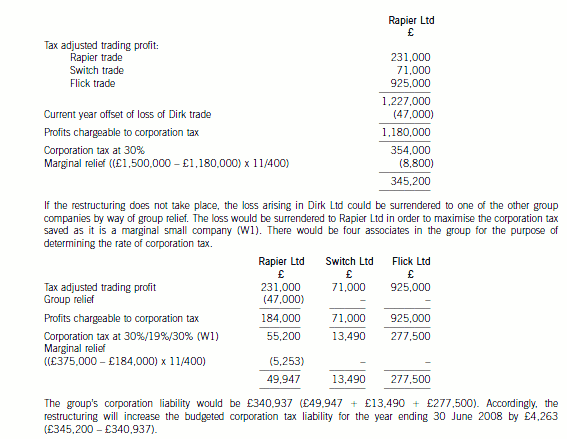
In relation to company law, explain:
(a) the limitations on the use of company names; (4 marks)
(b) the tort of ‘passing off’; (4 marks)
(c) the role of the company names adjudicators under the Companies Act 2006. (2 marks)
(a) Except in relation to specifically exempted companies, such as those involved in charitable work, companies are required to indicate that they are operating on the basis of limited liability. Thus private companies are required to end their names, either with the word ‘limited’ or the abbreviation ‘ltd’, and public companies must end their names with the words ‘public limited company’ or the abbreviation ‘plc’. Welsh companies may use the Welsh language equivalents (Companies Act (CA)2006 ss.58, 59 & 60).
Companies Registry maintains a register of business names, and will refuse to register any company with a name that is the same as one already on that index (CA 2006 s.66).
Certain categories of names are, subject to the decision of the Secretary of State, unacceptable per se, as follows:
(i) names which in the opinion of the Secretary of State constitute a criminal offence or are offensive (CA 2006 s.53)
(ii) names which are likely to give the impression that the company is connected with either government or local government authorities (s.54).
(iii) names which include a word or expression specified under the Company and Business Names Regulations 1981 (s.26(2)(b)). This category requires the express approval of the Secretary of State for the use of any of the names or expressions contained on the list, and relates to areas which raise a matter of public concern in relation to their use.
Under s.67 of the Companies Act 2006 the Secretary of State has power to require a company to alter its name under the following circumstances:
(i) where it is the same as a name already on the Registrar’s index of company names.
(ii) where it is ‘too like’ a name that is on that index.
The name of a company can always be changed by a special resolution of the company so long as it continues to comply with the above requirements (s.77).
(b) The tort of passing off was developed to prevent one person from using any name which is likely to divert business their way by suggesting that the business is actually that of some other person or is connected in any way with that other business. It thus enables people to protect the goodwill they have built up in relation to their business activity. In Ewing v Buttercup
Margarine Co Ltd (1917) the plaintiff successfully prevented the defendants from using a name that suggested a link with
his existing dairy company. It cannot be used, however, if there is no likelihood of the public being confused, where for example the companies are conducting different businesses (Dunlop Pneumatic Tyre Co Ltd v Dunlop Motor Co Ltd (1907)
and Stringfellow v McCain Foods GB Ltd (1984). Nor can it be used where the name consists of a word in general use (Aerators Ltd v Tollitt (1902)).
Part 41 of the Companies Act (CA) 2006, which repeals and replaces the Business Names Act 1985, still does not prevent one business from using the same, or a very similar, name as another business so the tort of passing off will still have an application in the wider business sector. However the Act introduced a new procedure to deal specifically with company names. As previously under the CA 1985, a company cannot register with a name that was the same as any already registered (s.665 Companies Act (CA) 2006) and under CA s.67 the Secretary of State may direct a company to change its name if it has been registered in a name that is the same as, or too like a name appearing on the registrar’s index of company names. In addition, however, a completely new system of complaint has been introduced.
(c) Under ss.69–74 of CA 2006 a new procedure has been introduced to cover situations where a company has been registered with a name
(i) that it is the same as a name associated with the applicant in which he has goodwill, or
(ii) that it is sufficiently similar to such a name that its use in the United Kingdom would be likely to mislead by suggesting a connection between the company and the applicant (s.69).
Section 69 can be used not just by other companies but by any person to object to a company names adjudicator if a company’s name is similar to a name in which the applicant has goodwill. There is list of circumstances raising a presumption that a name was adopted legitimately, however even then, if the objector can show that the name was registered either, to obtain money from them, or to prevent them from using the name, then they will be entitled to an order to require the company to change its name.
Under s.70 the Secretary of State is given the power to appoint company names adjudicators and their staff and to finance their activities, with one person being appointed Chief Adjudicator.
Section 71 provides the Secretary of State with power to make rules for the proceedings before a company names adjudicator.
Section 72 provides that the decision of an adjudicator and the reasons for it, are to be published within 90 days of the decision.
Section 73 provides that if an objection is upheld, then the adjudicator is to direct the company with the offending name to change its name to one that does not similarly offend. A deadline must be set for the change. If the offending name is not changed, then the adjudicator will decide a new name for the company.
Under s.74 either party may appeal to a court against the decision of the company names adjudicator. The court can either uphold or reverse the adjudicator’s decision, and may make any order that the adjudicator might have made.
(b) Prepare a consolidated balance sheet as at 31 October 2005 for the Lateral Group in accordance with
International Financial Reporting Standards. (21 marks)
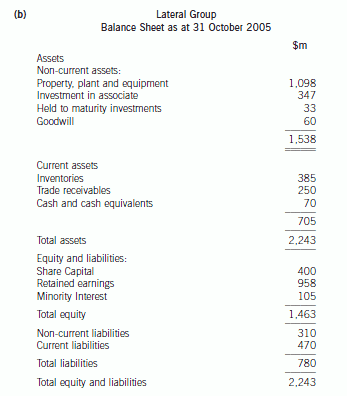
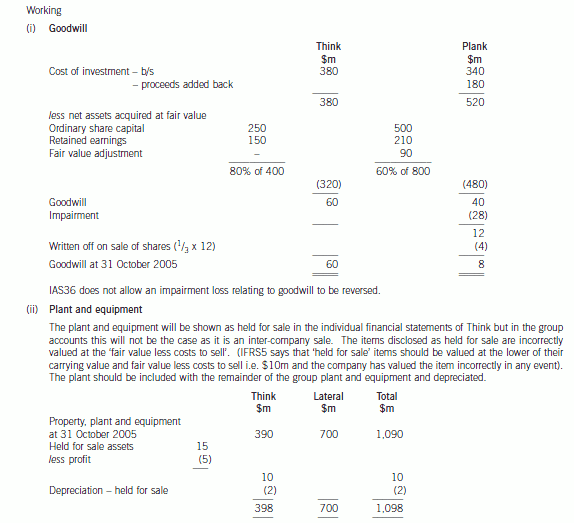
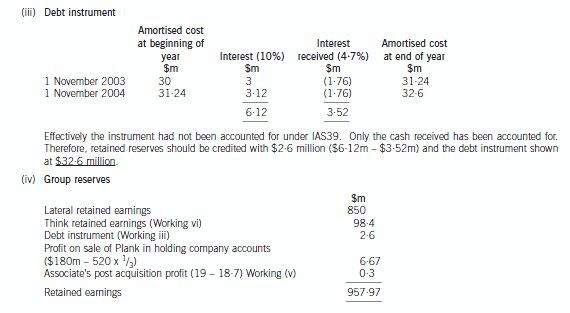
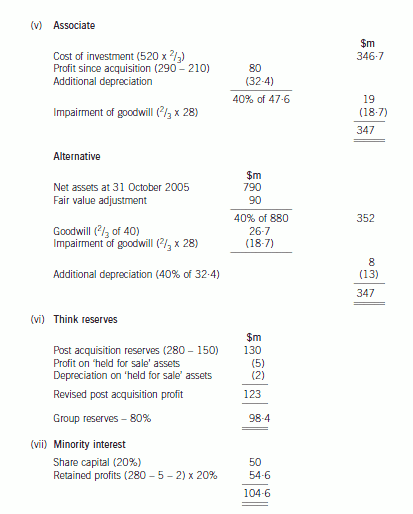
声明:本文内容由互联网用户自发贡献自行上传,本网站不拥有所有权,未作人工编辑处理,也不承担相关法律责任。如果您发现有涉嫌版权的内容,欢迎发送邮件至:contact@51tk.com 进行举报,并提供相关证据,工作人员会在5个工作日内联系你,一经查实,本站将立刻删除涉嫌侵权内容。
- 2020-02-29
- 2020-01-09
- 2020-01-09
- 2020-01-02
- 2020-01-09
- 2020-01-09
- 2020-01-09
- 2019-07-20
- 2020-01-09
- 2020-03-08
- 2021-05-23
- 2019-07-20
- 2020-01-09
- 2020-02-29
- 2020-01-09
- 2019-03-20
- 2020-01-09
- 2020-02-29
- 2020-01-03
- 2019-07-20
- 2019-07-20
- 2020-05-20
- 2019-12-06
- 2019-07-20
- 2019-07-20
- 2019-07-20
- 2020-01-09
- 2020-01-09
- 2020-01-09
- 2020-01-09